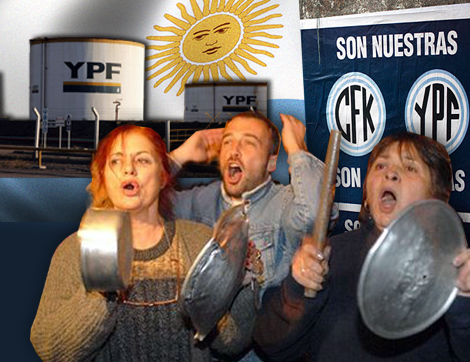
• Since debt repudiation in 2002, country has flourished; IMF, foreign oil interests ousted
By Gonzalo Baeza
In a telling rebuke of the international bankers, Argentina has once again affirmed its economic independence by repudiating its debt and taking control of its domestic oil production for the benefit of its own people.
Drawing the ire of the United States, the European Union and the World Bank, the Argentine government nationalized its oil company Yacimientos Petrolíferos Fiscales (YPF), in early May, freeing the country’s economy from the international oil cartels. The decision is the latest run-in between the populist government of Argentina and globalist forces which seek to make it conform to a model of de-industrialization and high indebtedness.
Argentina became one of the bogeymen of the international financial media when in 2002 its government decided to default on its $95 billion foreign debt with the International Monetary Fund (IMF) and other usurious creditors. Until then, Argentina had been hailed as the IMF’s “model pupil” in Latin America, dollarizing its economy, selling strategic industries, such as YPF, to foreign multinationals and deregulating its financial industry. The effects of these policies climaxed shortly before the country defaulted, as dollarization made Argentina’s exports more expensive and less competitive, created massive deficits and fostered a chronic dependency on foreign capital.
After Argentina put an end to dollarization and other IMF-mandated structural reforms in 2002, financial analysts predicted ruin for the country’s credit and the collapse of its economy. Nonetheless, it took Argentina only three years to pay its $10 billion debt to the IMF in full while continuing to pay its other creditors. As former Argentine President Nestor Kirchner said in 2005: “There is life after the IMF, and it’s a very good life.”
In spite of being effectively shunned from the international credit markets, the Argentine economy has grown 90% over the last decade—one of the fastest GDP growths in the Western Hemisphere for this period. In addition, unemployment fell from 22% in 2002 to less than 6.7% in the Q4 of 2011.
If defying the IMF’s diktats and proving expert financial analysts wrong weren’t enough, the Argentine government nationalized a 51% stake in YPF, taking ownership away from Spanish multinational firm Repsol.
What prompted the decision on the part of Argentine President Cristina Fernandez—Kirchner’s widow and the heir-apparent of his populist legacy—to take over oil production was Repsol’s inability to produce enough oil to meet the needs of an expanding Argentine economy.
Over the last decade of populist rule, oil-rich Argentina has subsidized its oil production, selling the commodity at a lower price to consumers and local industries in order to spur the local economy. This policy has been systematically questioned by both foreign oil cartels and Repsol. Even as YPF made healthy profits and distributed hefty dividends among stockholders, its officers claimed that the country’s regulation prevented them from investing more in domestic oil exploration.
From 2004 to 2011, Argentina’s oil production fell by nearly 20% and gas by 13%. YPF, which accounts for one-third of the country’s oil production, was at the center of this decline. Oil imports doubled in 2011 to $9.4 billion and, for the first time in 17 years, Argentina became a net importer of oil and gas.
“It’s very clear that Repsol was not fulfilling its obligations to Argentina,” sociologist and veteran analyst of Latin American affairs James Petras told AMERICAN FREE PRESS. “The government’s reaction to this was to try to get Repsol to increase production. Repsol very arrogantly said: ‘You end price controls, and we’ll produce for the local market.’ They actually were using low levels of production to force a change in government policy.”
So far, the internationalists have been less than amused with the move.
World Bank President Robert Zoellick attacked it as giving in to “populism” and “protectionism.”
When asked about the nationalization of YPF during a recent tour of Latin America, Secretary of State Hillary Clinton said: “Having an open market is a preferable model. Models that include competition and market access have been the most successful around the world.”
As part of its retaliatory efforts, Repsol and American financial advisory firm Texas Yale Capital Corp. filed a lawsuit against the Argentine government in U.S. District Court in Manhattan. The plaintiffs argue Argentina must launch a takeover bid for expropriated shares and should compensate Repsol for damages.
“The international community’s response has been absolutely hysterical,” Petras told AFP. “When one looks at the general pattern of the Argentine economy, they’ve been growing at a rate of 8% a year. Meanwhile, the Spanish government has been going backwards for the last five years,” Petras said. “The European Union and the U.S. government are favorable to Repsol as well. All the governments that favor Repsol have terrible records. Who are they to advise the Argentines?”
Gonzalo Baeza is AFP’s South American bureau chief and a freelance journalist based in Argentina.

